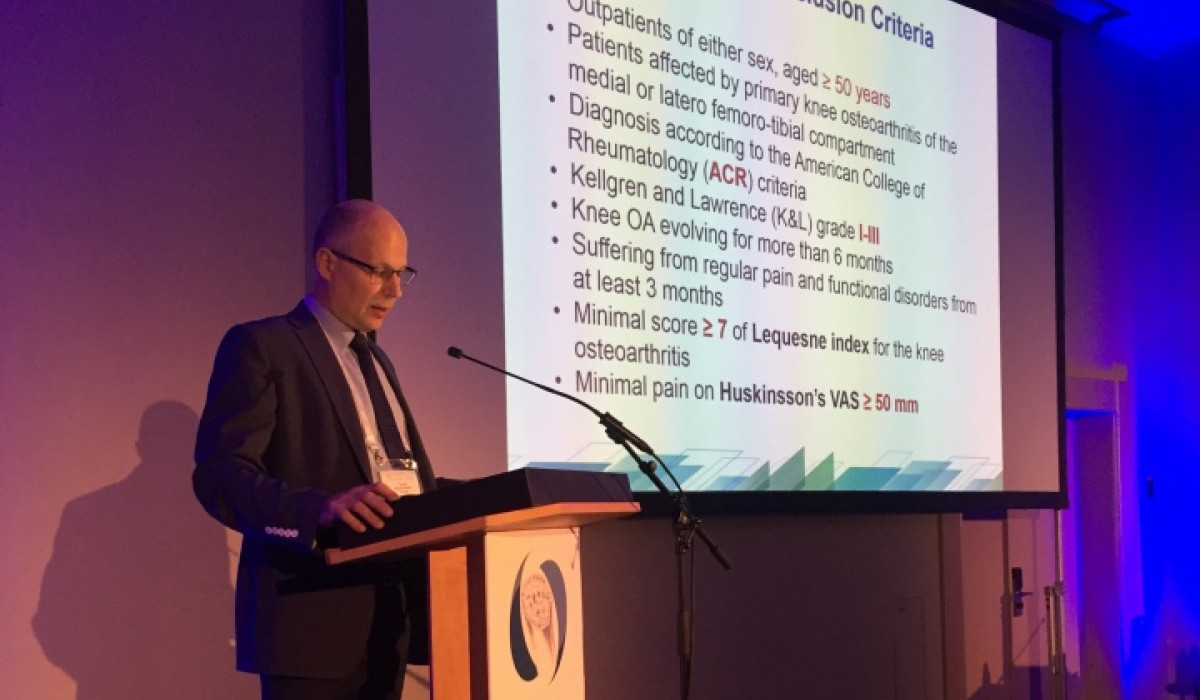Chondroitin sulfate is as effective as celecoxib and superior to placebo for pain reduction and improvement of functional disability in patients with knee osteoarthritis
- This is the main conclusion of a new clinical trial involving more than 600 patients from 5 European countries which will be presented tomorrow at the BMJD congress
- New evidence will also be presented showing that long-term use of analgesics (the traditional treatment of choice in osteoarthritis) is associated to greater radiographic progression of knee osteoarthritis and to an increased risk of requiring a prosthesis
- International medical guidelines, such as PANLAR, recommend use of pharmaceutical grade chondroitin sulfate for symptomatic treatment of hand, hip, and knee osteoarthritis

A new clinical trial shows that chondroitin sulfate is as effective as celecoxib and superior to placebo for pain reduction and improvement of functional disability in patients with knee osteoarthritis. This is a phase III, multicenter, randomized, double-blind, double-dummy study called CONCEPT (ChONdroitin vs Celecoxib vs Placebo Trial) which will be presented tomorrow at the symposium organized by Bioiberica and IBSA at the 4th World Congress on Controversies, Debates & Consensus in Bone, Muscle & Joint Diseases (BMJD) in Barcelona.
The study enrolled 604 patients from 16 centers in Belgium, Czech Republic, Italy, Poland, and Switzerland with knee osteoarthritis to investigate the symptomatic effects of chondroitin sulfate (800 mg/day) and the anti-inflammatory drug celecoxib (200 mg/day) as compared to placebo. “A great controversy still exists as to which should be the treatment of choice for osteoarthritis. Analgesics and anti-inflammatory drugs have traditionally been used, but they are increasingly associated to toxicity warnings. This trial has provided statistically significant evidence that treatment with pharmaceutical grade chondroitin sulfate is an effective and safe alternative for long-term treatment of patients with knee osteoarthritis” according to Dr. Tomasz Blicharski, Department of Rehabilitation and Traumatology of Lublin University (Poland) and investigator of the study.
In this regard, Dr. Ali Guermazi, director of the Quantitative Imaging Center of the Boston University School of Medicine, will present the results of an epidemiological study, published in the journal Osteoarthritis and Cartilage, to determine the association between use of analgesics and progression of osteoarthritis. “After three years of follow-up, it may be concluded that long-term use of analgesics is associated to greater radiographic progression of knee osteoarthritis and to an increased risk of prosthesis requirement”, says Dr. Guermazi. Specifically, in the group treated with analgesics, risk of progression increased by 91%, and need for prosthesis increased by 157%.
On the other hand, Dr. Maritza Quintero, Chair of the Venezuelan Society of Rheumatology and member of the PANLAR Board of Directors, adds: “The therapeutic efficacy of analgesic and anti-inflammatory drugs is unquestionable, but we are increasingly aware that they should be used for short time periods and for specific episodes of the disease. Use of safer alternatives, such as pharmaceutical grade chondroitin sulfate, is highly advisable, and scientific evidence showing its safety and efficacy is increasingly greater”.
As a conclusion, an international review published in the Molecules journal stating that not all chondroitin sulfate molecules available in the market are the same will be presented: “The great variability in quality of starting materials and in extraction and purification procedures of the marketed products may result in physico-chemical differences with different biologial effects that may compromise clinical efficacy and safety”, explains Dr. Johanne Martel-Pelletier, investigator from Montreal University and author of the review, who adds: “This is why the guidelines and consensus documents recommend chondroitin sulfate of high purity, consistent and traceable, subject to comprehensive safety controls, in accordance to pharmaceutical manufacturing standards”.
It is calculated that there are in Spain 7 million people who suffer from osteoarthritis, a chronic disease of the joints that causes pain, restrictions in mobility and a significant loss of quality of life.


